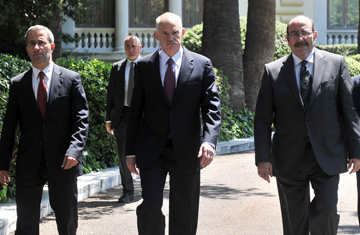
Greek Prime Minister George Papandreou, center, walks with his top advisers Nikos Ziogas, left, and Nikos Athanasakis after a meeting with Greek President Karolos Papoulias in Athens on May 3, 2010
It was the deal that could save Greece, the euro zone and perhaps even the entire European project. But no one was celebrating on Sunday, May 2, after the euro-zone governments agreed on a three-year, $145 billion rescue package to bail out the debt-ridden Greek economy.
Greek Finance Minister George Papaconstantinou described his country's options as "the choice ... between collapse and salvation," but he must have grit his teeth as he accepted the savage terms imposed by the 16-member euro zone and the International Monetary Fund, which are jointly financing the emergency, low-interest loan package.
Athens has agreed to a new program of austerity measures, which will only add to the pain of a severe recession (the Greek economy is already predicted to shrink by 4% this year). The aim is to slash the country's deficit, which reached 13.6% of gross domestic product last year, to below 3% by 2014. Among the measures agreed to are cuts in defense spending, a hike in value-added tax, a new business tax, a freeze in public-sector salaries and pensions, and a cap on annual holiday bonuses.
At the same time, the package aims to make the Greek economy more competitive. It is not just about making it easier for businesses to hire and fire, but also changing the culture of corruption that the crisis has exposed. This is exemplified by the Greek government itself, with successive administrations systematically fiddling their accounts by masking the true debt and deficit levels. Indeed, the first concerns about a Greek euro crisis emerged last year, when newly elected Prime Minister George Papandreou revealed the extent of the deceptive bookkeeping.
But if Greece has to brace itself, the other euro-zone countries have had to swallow hard in agreeing to the deal. The bill was already set to be huge, but delays raised it dramatically. Just a few weeks ago, euro-zone ministers were talking about a $60 billion rescue package — a little more than one-third of the size of the final bailout. Yet while they argued about how much hurt Greece could bear, the financial markets continued to bet against the country. The crunch came last week, when credit-rating agency Standard & Poor's downgraded Greek debt to junk-bond status and knocked down its ratings for both Spain and Portugal.
With the risk of contagion rising alarmingly, the governments finally agreed to a "shock and awe" package that aims to emphatically close down any further market buffeting of Greece and the euro. "All Europeans ... have the mission to secure the stability of the euro, and that is what we are doing today," said German Finance Minister Wolfgang Schäuble on Sunday. But it took Germany weeks to agree to help Greece, and that delay and others effectively tripled the cost of the bailout. "The euro zone has been hesitant and haphazard in its response to Greece," says Marco Annunziata, chief economist of Italy's Unicredit Bank. "This uncertainty only fuels contagion."
So, why does the deal cost so much? In part because the euro zone simply does not have the management tools to handle such a crisis. Despite the Lisbon Treaty's coming into force last year and the creation of new posts — with new responsibilities — at the top of the European Union, the euro zone has retained a loose structure, with authority split awkwardly between finance ministers, the European Commission and the European Central Bank. "Credibility has clearly suffered in the E.U.," says Beat Siegenthaler, an exchange strategist at UBS AG, in Zurich. "But the euro is relatively new, so it's no surprise that design flaws emerge. The question is how to deal with them."
Politics, too, appears to have muddled the euro zone's response. German Chancellor Angela Merkel has come under particular criticism for seemingly attempting to delay any decision on a deal for Greece until after the important regional elections on May 9. "The troublemaker in chief has been Germany," says Thomas Klau, head of the Paris office of the European Council on Foreign Relations. "Angela Merkel has played a risky and reckless game in trying to postpone the deal," he adds. "It has only served to reinforce the sense in the financial markets that the euro zone will not get its act together. Merkel's delay has cost both the Greek and German taxpayer, and the money has simply ended up in the coffers of speculators."
For now, though, the deal is done. All the euro-zone members are expected to ratify it by Friday, allowing the first slice of aid to be handed out next week. But that doesn't mean Greece is out of the woods: public anger against the austerity program is rising, with reports of protests and riots filling television screens. And there is an ongoing risk that markets will continue to bet against the government's ability to deliver its promised reforms. But as the other euro-zone countries start writing their checks for Greece, there may be a lesson from this crisis in an age-old business adage: Time is money.
